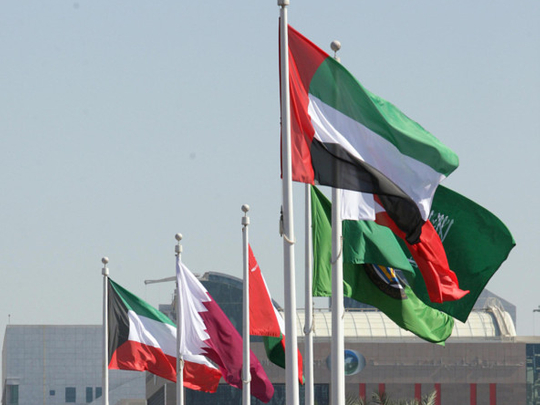
In a span of less than two weeks, the Islamic State of Iraq and the Levant (Isil) has made its way through the Anbar province in the west of Iraq and advanced so far as to capture the town of Al Rutba, placing its fighters at only tens of miles away from the Saudi border. For the Gulf states, the enemy is quite literally at the gates.
Whereas US policymakers may have the luxury of arguing over whether the spectacular advance of the Isil constitutes a national security threat serious enough to warrant US intervention, leaders in Saudi Arabia, Kuwait and the rest of the GCC do not. But the prospect of the GCC playing a role in resolving the conflict faces several serious obstacles. The Gulf states had already attempted to counter the influence of Isil, especially in Syria. They have outlawed it, promised to apply punitive measures against its members and backed the Free Syrian Army and other factions opposed to it. Some Gulf states could do more to crackdown on private donations to Isil, though in reality these are likely to be dwarfed by the amount of assets the group has seized in Syria and in Iraq.
When it comes to the conflict in Iraq, however, a segment of public opinion in the Gulf appears to sympathise with the Sunni militants and tribes battling the pro-Iranian Prime Minister Nouri Al Maliki and the Shiite militias. This sympathy is reinforced by the likes of the Sunni Association of Muslim Scholars in Iraq who discount the role of Isil in what they describe as a ‘revolution’ against Al Maliki’s authoritarian rule. Isil seems to have learnt from its mistakes in Syria and not repeated the fatal error of alienating other Sunni factions that once helped demonise it in the eyes of Sunni public opinion.
Shiite clerics and militia leaders appear to have equally fanned the flames of sectarianism. Widely interpreted as an instruction to the Shiites to face off against the Sunnis, the call to arms issued by Shiite cleric Grand Ayatollah Al Sistani only exacerbated tensions. Shiite militias, such as Muqtada Al Sadr’s Mehdi Army, organised military parades responding to the “call of the marji’iyya” (or religious authority), in reference to the Grand Ayatollah in response. Reports of the Iraqi army carrying out executions against Sunni prisoners have also sparked anger.
The sectarian language of the conflict, therefore, puts limits on the options available to the Gulf against Isil. Gulf leaders are neither insensitive nor immune to popular dissatisfaction. The last time Saudi Arabia allied with US forces to fight another [Sunni] Muslim country, namely Iraq under Saddam Hussain’s rule in the 1990-91 Gulf War, a popular ‘Sahwa’ (Awakening) movement emerged among religious Saudi youths serious enough to threaten the monarchy’s legitimacy. The political unrest that accompanied the so-called Arab Spring has also underscored the importance of heeding popular grievances.
Military perspective
From a military perspective, unlike the US, the GCC does not possess the capability to directly involve itself in the conflict with Isil. For starters, tense relations between the GCC and Al Maliki rule out any military role for the GCC on Iraqi soil. Moreover, GCC troops lack experience on the battlefield, have little ties to their Iraqi counterparts and are unfamiliar with Iraq’s terrain.
But the six GCC states collectively enjoy a large, modern air force which should be put to use to repel any threats from Isil insurgents at the border. Saudi Arabia should begin to place ground troops under the Peninsula Shield Force near the border with Kuwait in order to provide immediate support should the tiny country request it. Saudi Arabia and the rest of the GCC should also renew their commitment to Jordan’s security, first by financially propping up its armed forces, but also by quickly agreeing on a framework for direct military assistance if need be. Diplomatically, the Gulf does not enjoy sufficient leverage in Iraq to bring different sides to compromise on its own. Within a framework of US-led negotiations however, Iran and Saudi Arabia could help bring the various Shiite and Sunni factions respectively to agree on a formula for political transition that excludes Al Maliki and isolates Isil. Both Iran and Saudi Arabia share a common interest in repelling Isil. In fact, they have successfully worked together in the very recent past to broker a political deal. In Lebanon, the two regional heavyweights proved instrumental in convincing the pro-Hariri 14 March Alliance and the pro-Hezbollah 8 March Alliance to form a coalition government back in February, even orchestrating a swap in portfolios traditionally held by each side
Ultimately, one fundamental condition to the success of any GCC response to the threat is its own leaders’ desire for collective action. Oman and Qatar tend to pursue their own approach to foreign policy, but realistically, Saudi Arabia, the UAE, Kuwait and Bahrain should be able to formulate a unified vision on addressing the situation in Iraq. Given the seriousness of the impending threat, Gulf leaders and diplomats have said very little in public on their preferences with regards to the situation in Iraq. This hardly seems appropriate. Instead, the GCC has a real interest in adding its voice to the debate on Iraq’s future, both as a potential interlocutor with Sunni tribes and factions and as a concerned neighbour whose own security now hangs in the balance.
Hasan Tariq Alhasan is a Bahrain-based economic and political analyst who writes regularly on Bahraini and Arab affairs.










